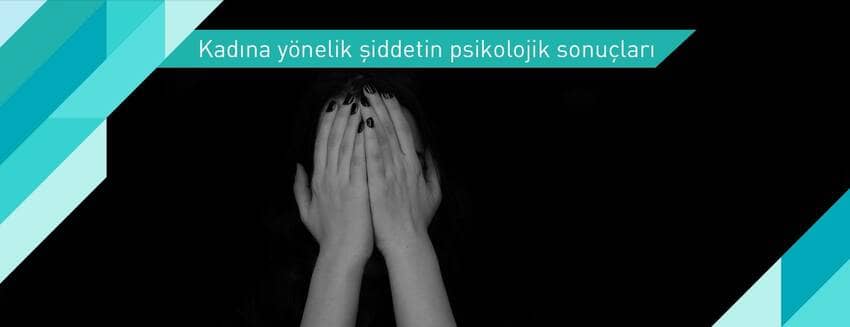
November 25 is commemorated as the International Day for the Prevention of Violence against Women. People who are subjected to violence may experience feelings of guilt, loneliness, fear, helplessness, insecurity, tension and restlessness, while the likelihood of many psychiatric disorders such as acute stress disorder, post-traumatic stress disorder, anxiety disorders, alcohol and substance abuse and depression may increase. According to experts, psychiatric and psychological support is of great importance.
On November 25, 1960, the bodies of Patria, Minerva and Maria Mirabel, three sisters who fought against the dictatorship in the Dominican Republic, were found at the bottom of a cliff. It was revealed that the Mirabel sisters had been raped and brutally murdered, and they became a symbol of the struggle against dictatorship. In the face of these developments that resonated all over the world, the United Nations decided on December 17, 1999 to adopt November 25 as the "International Day for the Elimination of Violence against Women".
Expert Clinical Psychologist Meral Sarıkaya from Üsküdar University NP Etiler Medical Center stated that violence is an individual and social problem and that being exposed to violence can shake the belief that the world is a safe place and can reveal many psychopathological problems.
There are four forms of violence
Defining violence against women as "all kinds of attitudes and behaviors that result in physical, psychological, economic and sexual harm due to the gender of the individual", Specialist Clinical Psychologist Meral Sarıkaya said, "Physical violence occurs when physical power is used to control, humiliate and punish women, psychological violence when emotional power is used, sexual violence when sexual power is used, and economic violence when superiority is established by using material power. According to the research on domestic violence against women in Turkey (2009), 39% of women across the country have experienced physical violence and 42% have experienced sexual violence, while 42% have experienced at least one of the two types of violence."
Post Traumatic Stress Disorder
Specialist Clinical Psychologist Meral Sarıkaya pointed out that women who are subjected to violence experience intense feelings of guilt, loneliness, fear, helplessness, insecurity, tension and restlessness and said, "Therefore, these people are likely to have many psychiatric disorders such as acute stress disorder, post-traumatic stress disorder, anxiety disorders, alcohol substance addiction, depression, as well as self-harm behaviors or suicide attempts."
How should a woman who has been subjected to violence deal with it?
Stating that it is important for women who have been subjected to violence to know where they can get help in terms of combating this situation, Specialist Clinical Psychologist Meral Sarıkaya gave the following information:
"Women who have been subjected to violence can get support from the following institutions: Family, Women, Children and Disabled Social Service Counseling Line Alo 183, ALO 155 Police Dispatch, ALO 156 Gendarmerie Dispatch, 112 Emergency, 0212 656 96 96 Domestic Violence Emergency Helpline. They can receive counseling, guidance and guidance services free of charge at the Provincial Directorate of Family and Social Policies or District Directorate of Family and Social Policies, Family Counseling Centers and Community Centers. ŞÖNİM (Violence Prevention and Monitoring Center) are units that monitor the measures taken against perpetrators and victims of violence to ensure that they are effective. These centers provide services in different areas such as legal, psychological, vocational and counseling. In addition, shelters, also known as guesthouses, were established to provide temporary shelter for women who have been subjected to violence or are at risk, together with their children, if any. This service is provided by the General Directorate on the Status of Women of the Ministry of Family and Social Policies, non-governmental organizations, municipalities, district governorships and governorships."
Meral Sarıkaya, Specialist Clinical Psychologist, stated that when subjected to violence or under such a risk, one can also apply to the nearest health institution and said, "If violence has been experienced, the necessary treatment is carried out and a report documenting the violence experienced can be issued. Those who are not in a position to pay a lawyer's fee can apply to the bar associations where they are located in order to benefit from free legal services. Women's NGOs are voluntary organizations. These organizations provide counseling and guidance services free of charge. Temporary accommodation needs are also met in organizations with guesthouses. Women's support units of municipalities provide psychological, medical, financial and legal support. In addition, free of charge accommodation is also offered if there are guesthouses."
Psychiatric and psychological support should be provided
Meral Sarıkaya, Clinical Psychologist Meral Sarıkaya stated that in cases where violence is applied and power imbalance is intense, women who are subjected to violence may feel fear, lack of control and uncertainty and may have difficulty in putting their help-seeking behavior into action in a sense of intense helplessness, "For this reason, it is important that women who are subjected to violence are informed about the resources they can get help and support and become aware. When faced with such a situation, they should immediately apply to institutions where they can receive support. They should continue their struggle to rebuild their lives in an environment where they will not be subjected to violence. At this point, psychiatric and psychological treatment of women exposed to violence constitutes an important step. If a psychiatric disorder has emerged, it is of primary importance for them to receive psychiatric treatment and psychotherapy support together with their psychiatric treatment and to get stronger and to rebuild their lives."
Expert Clinical Psychologist Meral Sarıkaya also pointed out that these treatments are mostly offered in governmental and non-governmental organizations.
